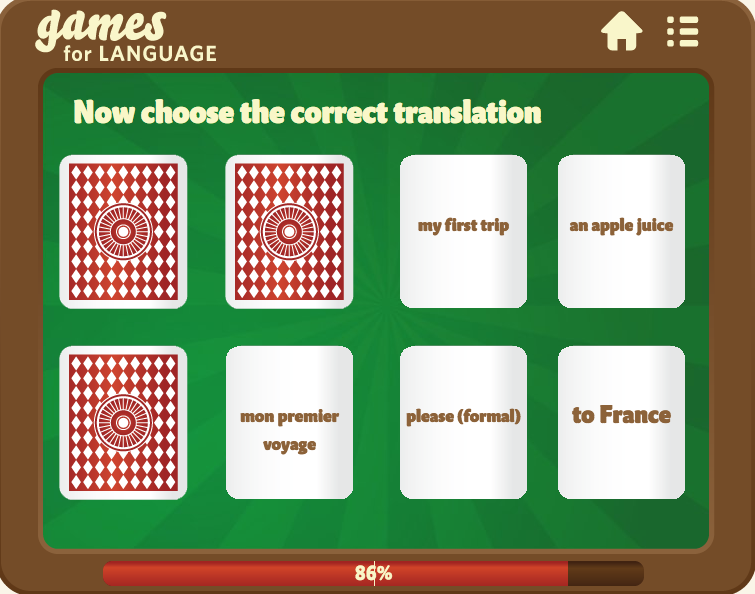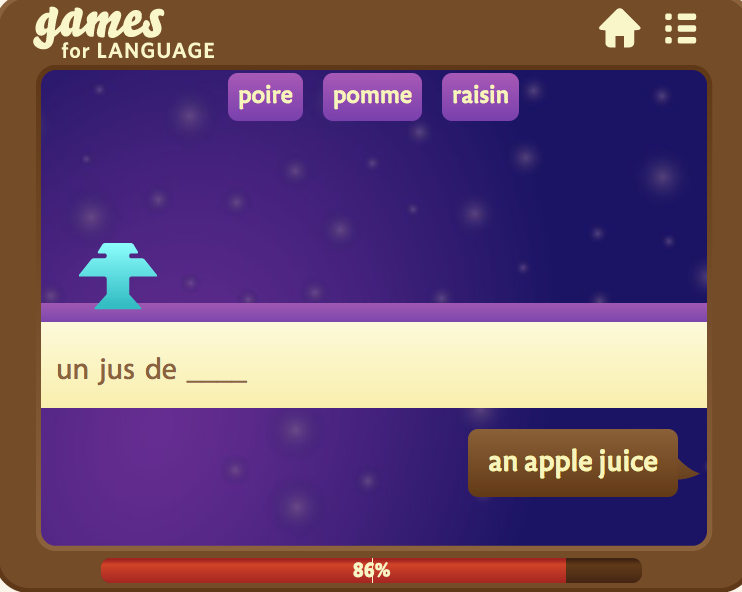A Ten-Year-Old Learns French With GamesforLanguage
 Public schools in the US traditionally have a week of school vacation in mid-February, that didn't change even during the pandemic. Since spending time with our grand-kids was out of the question, Peter had came up with a suggestion for an activity they could do.
Public schools in the US traditionally have a week of school vacation in mid-February, that didn't change even during the pandemic. Since spending time with our grand-kids was out of the question, Peter had came up with a suggestion for an activity they could do.
After all, their parents had to work, and the kids needed some projects. The children are learning other languages, so we thought we'd give them the challenge to go through the French 1 and the German 1 course. At the end of the week, we would interview them.
Our ten-year-old grandson Will chose French. His family has traveled a few times to France, and he's been getting regular French lessons on Zoom. By the end of the week, he had finished three lessons of French with GamesforLanguage.
We're encouraging Will to continue playing the French course and the Quick French Language Games. We "interviewed" him on the front lawn of his home where he was building a snow fort. It was obviously not a school-like setting for him, and he was pretty relaxed.
Did any answers surprise us? Yes, a couple of them did.
Here are the Questions about learning French with GamesforLanguage:
Question 1: You've been learning French for a little while now, what do you like about French?
• I like the sounds, French has cool sounds.
His answer was quick and spontaneous and surprised me at first. I did not expect it to be "sounds". But then why not? Hearing sounds, imitating them, and producing sounds to get things, that's how children actually learn their first language. Reading and writing doesn't come until later and takes several years of schooling.
Question 2: What's the first French word that comes to your mind right now? 
• I want to say "juice" but I can't remember the French word. But I do remember "pomme".
Okay, now we know kids can't remember everything either. In our French 1 course, "jus", "pomme" and "jus de pomme" come up early and several times. Looks like it was "pomme" that stuck.
Question 3: Do you remember your visit in France? Did you actually have the chance to say things in French? Order food? Do you remember any words?
• Oh yes, a lot. I said things in French when we were in restaurants. I always ordered what I liked. What I said many times: "De la glace. Je veux de la glace, s'il vous plaît."
Clearly, even kids learn to say things that they "need" to say, much better than stuff they just have to learn by rote. That's as true for them as it is for us, and includes saying things in another language.
Question 4: What is your favorite French word?
• The word I really like is "fromage", and also because it tastes to good.
A good example here of associating a word with one of the senses. For language learning, it's well known that "sensory input" boosts your memory.
Question 5: What French sound do you find a little hard to pronounce?
• The sort of harsh sounds are hard. I'm thinking of, like, "cr", "croissant" or "crème".
I was expecting him to say that he found the "nasal" sounds hard, as in "moi", "non"; or the French "u", as in "tu". But he had no problems with those. Just shows: mastery of new sounds is an individual thing, not everyone has the same difficulties.
Question 6: How do you practice a sound that's hard?
• Oh, I say it over and over and over again, "croissant", "croissant", "croissant au chocolat" ...
For anyone - children or adults - learning new sounds takes practice. To produce a sound that's not in your own native language, you have to move your mouth (tongue and lips) in a different way. And that takes practice until it becomes automatic.
 Question 7: When you're playing GamesforLanguage - What is the easiest game for you?
Question 7: When you're playing GamesforLanguage - What is the easiest game for you?
• The easiest? It's the Memory Game. That's the game where you see 4 cards for a word. I had no problem picking the right one.
The Memory Game is multiple choice and a good way to introduce 4 new words or phrases. You first see the right match for each word (French and English equivalent). Then the English cards are mixed up and you need to pick the one that's the translation.
Right in the first lesson, you have the 4 phrases: "un jus de pomme" (an apple juice), "si'il vous plaît" (please), "mon premier voyage" (my first trip), "en France").
Question 8: On GamesforLanguage - When playing a game, do you repeat out loud or just in your head?
• I definitely repeat out loud. Sometimes again.
He's got that right! An online game doesn't make you fluent, but saying what you hear out loud is good practice for improving you pronunciation and listening skills. To be able to say a word right, you have to hear it correctly and to check whether your pronunciation matches. Just silently thinking what about the French is not good enough.
Question 9: What game do you find a little hard?
• The Clouds Game, it's harder to pick the right one.
Snap Clouds is a recall game, which makes it a little harder to pick the correct answer. Plus, the choices are not as obvious as in the Memory Game. For example, you'd be asked to choose the correct pronoun and form of the verb: For "I speak", you have the choices: "tu parles", "je parle", "elle parle", "il parle".
Question 10: What game is the most fun to do? 
• I like the Space Invaders. I don't find that hard, I can shoot the right word.
Actually, we call that game "Word Invaders". With it you build phrases and sentences, word by word. For each word you get two or three choices. For example, you're asked to build the phrase in French: "An apple juice, please (formal)". The answer will be: "Un jus de pomme, s'il vous plaît".
These are the choices that you have for each of the words:
1. un une
2. jus eau vin
3. à de
4. poire pomme raisin
5. s'il mais
6. vous tu
7. plaît parle passe
Question 11: What do you think you learned most with GamesforLanguage: words, pronunciation? Or has it improved your understanding of what the speakers say?
• I learned reading French the most. I didn't know how to read much French before.
This answer surprised me because I hadn't thought about it. In his Zoom lessons, he hears his French tutor and answers in French, but he doesn't see the words. So, seeing how the French words he hears are written was a novelty and probably the most challenging for him.
Question 12: Do you like getting points at the end of a lesson?
• Yes, I like it. It feels like you earned something.
"Earning" something seems to matter to some learners. At the end of each lesson, we've set a minimum percentage of correct answers a player must reach in order to continue with the next lesson. That number goes up gradually, from 50% in the first 6 lessons, to 90% in the last 6 lessons.
He also told us that he had not listened yet to the lesson audios or downloaded each lesson's PDF file. (You can access the audio for each level (six lessons) via the Podcast link and the PDF file via the link under each course lesson.)
It was fun to talk with our ten-year-old grandson about his tryout of learning French with our GamesforLanguage course. He's one of our younger users.
We have several school classes located in the US, UK, and Australia playing French, German, and Spanish. What appeals are the Quick Games and the game structure of the courses.
Besides, our games, courses, and podcasts are completely FREE, there are no Google advertisements.
Only our courses require a simple registration and a password - which is only needed so you can continue your course where you left off.
Quick Games, Podcasts and Blog can all be accessed by just clicking on the link
